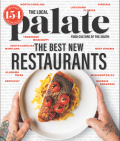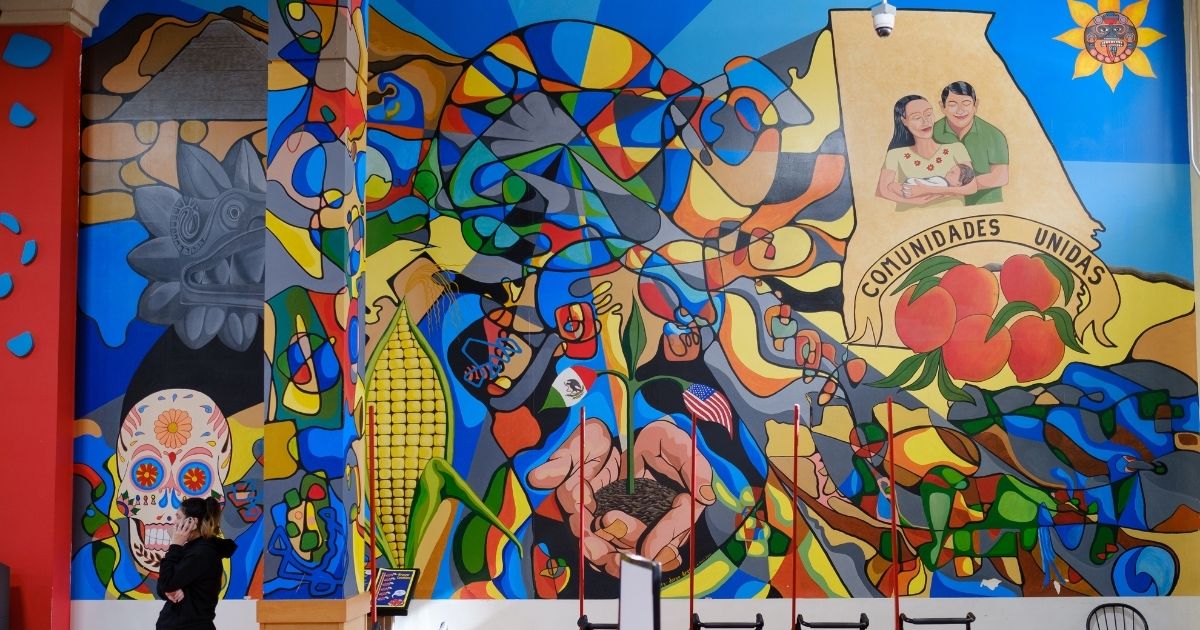Moving back to Atlanta after almost two decades, one writer sees how a six-mile stretch of immigrant businesses are evolving Georgia along the Buford Highway.
One of the first restaurants my husband and I went to after we were vaccinated was Mamak, a Malaysian restaurant in Asian Square on Buford Highway, a major immigrant thoroughfare running through northeast metro Atlanta.
Our server, a young Malay woman, brought us roti canai, a crispy, flaky, buttery flatbread that we dipped in a small bowl of coconut- infused chicken curry. My husband’s face lit up—he was instantly taken back to his years living in Malaysia as a child. We finished our delicious meal and wrapped up our evening with jasmine tea from Sweet Hut, an Asian bakery a few doors down from the restaurant.
I was, of all things, relieved that my husband could find a taste of a place he once called home, here off the side of a highway in sprawling Atlanta.
But if I had brought him here thirty years ago, when I used to dine in a Chinese restaurant on the other side of the strip mall, that certainly would not have been the case.
Childhood in Georgia with Buford Highway
I moved to Georgia in 1989, as a seven year-old, at a time when Atlanta’s north ern areas were mostly forest, but where pockets of subdivisions were starting to take root. There were just a handful of other Pakistani families then (we found our first friends by thumbing through the white pages) and there was just one Pakistani restaurant in the entire metro area that we knew of: Mughals off Jimmy Carter Boulevard. There, my dad would order classic dishes from his childhood—paya (soup made with hooves of goats, cows, or sheep), nihari (slow-cooked meat stew), or haleem (another meat stew, but mixed with barley and lentils).
Our family’s food adventures outside of South Asian cuisine and standard American fast-food fare were mostly limited to a few Chinese restaurants. This wasn’t unusual: Chinese food is the staple “foreign cuisine” of South Asia. It was equal parts familiar and exotic to those of us who grew up on daal and rice.
Emerald China was one of our go-to spots. Just a ten-minute drive from our home in Alpharetta and located in a strip mall across from a Kroger, it satisfied our cravings for kung pao chicken and fried rice at an affordable lunch-special price. The gentle instrumental music, the waitresses wearing fitted shirts with Chinese collars, and the small metal kettles of jasmine tea all did the trick: catering directly to customers who wanted the “Asian experience,” transplanting us from our suburban confines to another world.
But every once in a while, we would embark on a much more ambitious food destination: “Let’s go to Buford Highway for dinner!” my dad would exclaim on a lazy Sunday afternoon. I’d feel a tingle of excitement as we drove the eleven miles down Peachtree Industrial Boulevard. The moment we hit the intersection of Buford Highway, it was like moving into another world. One where businesses were run by immigrants and for immigrants.
The World Meets
We passed auto repair shops, gas stations, and occasionally an ethnic restaurant like a tofu house, marked with bright yellow Korean script, on our way to our destination, Asian Square. It was (and still is) a U-shaped strip mall on the highway. Then, there were a few restaurants, small shops where you could buy things like herbal teas or porcelain cats, and even a Chinese medicine shop. At one end of it was our favorite spot, Cantonese restaurant called BBQ Corner II.
It was always busy. The customers (almost entirely Asian) packed into the restaurant, filling up the cafeteria-style tables and chairs. There was no gentle classical Chinese music playing in the background here—I only ever heard the waiters shouting orders in Cantonese over the din of chatting diners.
My dad seemed comfortable here, the way he was when he was in other spaces run by immigrants, for immigrants. He could drop the formalities and niceties he’d adopted in his majority-white corporate office or our majority-white neighborhood, and finally be himself. He’d wave over the waiter and ask questions about the menu, no hellos or greetings exchanged. We’d order the dishes we always ordered at Chinese restaurants: kung pao chicken, fried rice, chicken corn soup. Fifteen minutes later, the waiter would bring out steaming plates of rice and glistening stir-fried chicken and place them on the lazy susan in the middle of the table.
I moved back to metro Atlanta in 2020, after living away for almost two decades, and found the city to be more diverse than the big northeastern cities, like New York and Washington, DC, I’d been living in for years. Yes, BBQ Corner II is still there, but now there are new businesses in Asian Square, meeting the tastes and preferences of the area’s ever-evolving communities.
Growth
Along with Mamak and Sweet Hut, there’s Roll it Up, a liquid nitrogen ice cream shop and Ding Tea, a Taiwanese tea house. Kamayan ATL, a Filipino pop-up-turned-restaurant, is slated to open soon. Also, today, Asian Square isn’t the only immigrant-centered shopping complex. There’s Orient Centre, Little Saigon, Plaza Fiesta, Pinetree Plaza, Northeast Plaza, and more. Home to more than 1,000 immigrant-owned businesses along a six-mile stretch, Buford Highway is now known as the “International Corridor.”
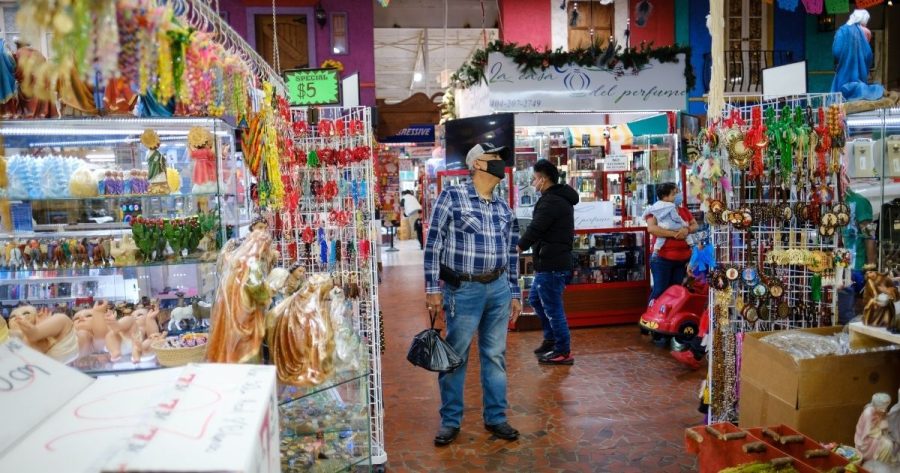
That growth, and the diversity that’s come with it, has put Buford Highway on the map, both nationally and internationally. But it has also meant new developments and rising home costs in the cities the highway intersects like Chamblee, Brookhaven, and Doraville—costs that have been super-charged by the pandemic.
“We see these bigger developments happening and I think that that’s one industry that did not stop [during the pandemic]. Affordability is a huge factor in how you make sure that you’re not pricing people out,” says Lily Pabian, executive director of We Love Buford Highway, a nonprofit dedicated to persevering the multicultural identity of the strip.
If that growth pushes out the communities that make Buford Highway what it is today, Atlanta will lose out, she says. “There’s a reason why people don’t go to certain restaurants in downtown Atlanta, or other places. There’s a reason why people up in Duluth still come back to Buford highway. There is a legacy here.”
Buford Highway’s Legacy
Pabian and her family are part of that legacy. In 1979, they moved to an apartment complex along the highway, where she remembers playing with her Uruguayan neighbors as a five-year-old. Her father was one of the founding members of the Chinese Cultural Center, where she grew up taking Chinese classes and attending community events.
As demographics in the state shift, development increases, and businesses adapt to day-to-day, pandemic-induced changes, it’s hard to know what will happen to Buford Highway and its legacy. But one thing is clear: People originating from all over the world continue to find some semblance of home in these six lanes of highway running through northern Atlanta.
If you’d driven down Buford Highway in the 1960s and 1970s, the word international would not have crossed your mind. It was a nondescript suburban thoroughfare dotted with used car lots, fast food joints, and low-income apartment complexes. That started to change in 1976, when Guido and Debbie Benedict, an immigrant couple from Cuba, opened the highway’s first ethnic restaurant, Havana Sandwich Shop. Ever since, the highway’s proximity to Atlanta, as well as the availability of affordable housing, have attracted waves of immigrant communities to move into its surrounding neighborhoods. The businesses and restaurants have shifted in lockstep with the demographic changes.
Vietnamese Cuisine Comes to Buford Highway
Jenny Nguyen, her five siblings, and her parents moved to Atlanta shortly after the passage of the 1980 Refugee Act, which lifted the ceiling on the number of refugees the US could resettle. Three generations of her family run Pho Bac, one of the first Vietnamese restaurants to open in metro Atlanta. Her niece, Lisa Nguyen, said growing up, she doesn’t remember ever going to a Vietnamese restaurant because there weren’t any around. Pho was something they ate at home.
“Every Sunday we’d come home from church and go over to [my grandmother’s] house and we’d eat pho. And then everybody would split up and go to work.” The Vietnamese community was small then, and the church served as its main gathering place. “I grew up in a community where everybody knows me. Everybody knows everybody,” Lisa says.
As the Vietnamese population grew (from 1980 to 1990, Georgia’s Vietnamese community quadrupled, from 2,000 to 8,000; today it’s more than 50,000), Jenny’s father, who served as a police officer in Vietnam, decided the time was right to switch from running a car dealership to opening a pho restaurant on Buford Highway. Jenny says her parents’ shop was the first Asian-owned business to sign a lease at the plaza, which is now known as Orient Center.
Pho Bac officially opened in 1997 with classic decor and a Vietnamese menu, but with North Vietnamese origins. Jenny’s parents, were both born in North Vietnam and chose the name accord ingly—pho bac translates to “northern noodle.”
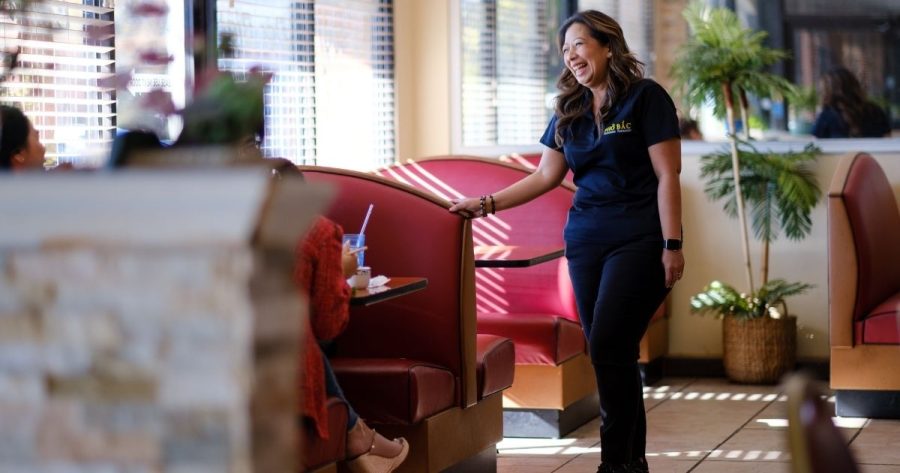
“Most Vietnamese, when you say Pho Bac, they know it originated from the north. The main difference is that we eat pho without bean sprouts, we just have basil, and maybe some lime or jalapeño pepper,” Jenny says.
Business was okay the first few years, with mostly Vietnamese patrons, but as word spread, more and increasingly diverse customers filled the tables. “People started to get to know us, our good cooking. The flavor that they love, that is very authentic to North Vietnam. It was all word of mouth because we don’t do much advertising,” Jenny adds.
Pho Bac Today
The menu has changed very little since the restaurant opened twenty-five years ago. Every morning at 8, Jenny’s sister Angie begins the preparation for the day’s pho, which involves cooking the broth for at least four hours, and season ing it with spices she doesn’t disclose.
“We have secret ingredients,” she says, her eyes twinkling. “Most people can Google what’s in there but every restaurant or every fam ily might have something else that they put into it.”
In September 2021, the Nguyen fami ly opened a second location in Duluth, home to some of the fastest-growing Asian communities in Georgia. “The reason why we opened the second location is for our children,” Jenny says. “My nephew, my daughters—they are the third generation for Pho Bac. So, of course we’d like to expand in that way. They continue on our legacy. My parents are aging and it will be my turn soon. Our children are going to be the next thing. So, we want to create some thing that can stay for a long time.”
While Asian communities have been both growing in number and expanding to different parts of metro Atlanta since the ’80s, a wave of immigration from Latin America began during the construction boom of the ’90s, as the city prepared for the Olym pics. Between 1990 and 2000, metro Atlanta’s foreign population grew by an incredible 233 percent. That growth sparked a whole new layer of business es, including, of course, restaurants.
A Fiesta on Buford Highway
Plaza Fiesta, less than two miles down the road from Pho Bac, embod ies that growth. It’s packed with more than 280 different businesses sitting side by side, creating the ambience of a city center, or “zocalo,” in Mexico. Carlos Diaz is the owner of three of those businesses—two clothing stalls and Carnitas Michoacan, a cafe selling tacos unique to central Mexico.
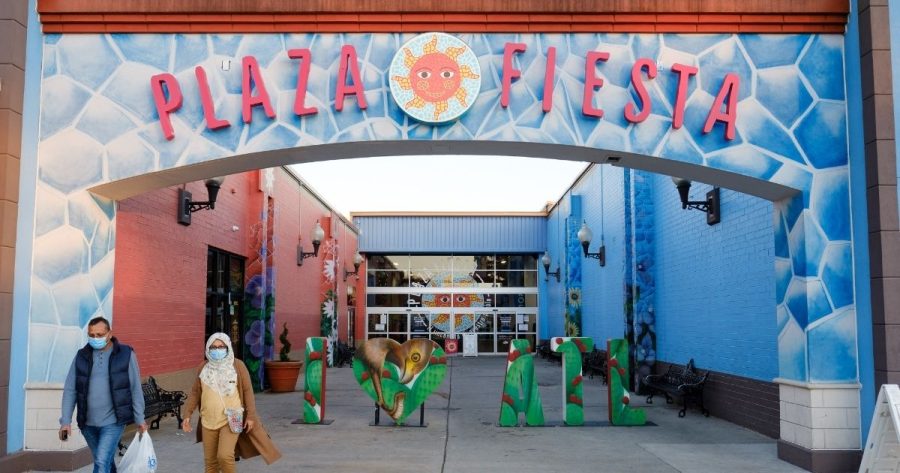
On a weekday afternoon, the cafe is buzzing. Latin music plays over the loudspeakers, young families sit at brown tables where plastic plates hold tacos piled high with meat, cilantro, and onions, and a waitress dressed in a t-shirt and sneakers greets guests with a big smile. Adjacent to the cafe is a clothing stall selling brightly colored quinceañera dresses.
“The menu is very simple because we focus on the meats. Carnitas means the way of creating or fixing them,” says Diaz. Filled with lard, deep-fried skin, lean meat, ear, tongue, stomach, and ribs, they’re cooked for about four hours. But like the cooks making pho, everyone has a slightly different way of making this classic dish. “You will use an orange. You will use Coke, cinnamon, onion, garlic, bay leaves, salt, pepper. The Coke caramelizes the meat, makes it look darker, and it makes it more crispy on the outside,” Diaz says.
Besides carnitas, you’ll also find food stalls selling everything from tortas to enchiladas to Salvadoran pupusas and Venezuelan arepas. “[People] come in waves. First it was Mexicans, then Co lombians, right now you have an influx of Venezuelans, and between all that el Salvadordans, Hondurans,” Diaz says.
Beyond the food, what draws people back to the plaza is that feeling of home. “You have people here who have never been back in Mexico since right after they gave papers here in 1985. In Mexico, on Sundays you used to go to the zocalo, which is the main street where girls and boys used to go to meet each other,” he explains. “They used to do the same thing here, inside of the plaza.”
Used to—because in 2008, Georgia passed a law making it illegal for those without documents to obtain a driver’s license. Deportations ramped up and the plaza wasn’t drawing the same crowds.
“A lot of people left. It was a very hard time for immigrants. Before that happened, if you came here on a Sunday, you could not walk inside the plaza. Have you seen the New York subway when it was busy? That’s how it was, inside of this area,” Diaz says.
Buford Highway in the Pandemic
The changes running through Geor gia reverberate along Buford High way—and the era of Covid-19 has been no different.
In March 2020, the future felt uncer tain. “At the beginning it was rough. People were not coming. They were afraid. They were not saying that it was a pandemic yet, but it really felt like it. We were only by ourselves looking at each other,” Diaz says. Plaza Fiesta closed for almost two months in 2020, and when it reopened, people didn’t come back right away.
Some businesses along the highway ended up closing in 2020, some reduced their hours, and some pivoted to offer takeout and curbside pickup. It hasn’t been easy.
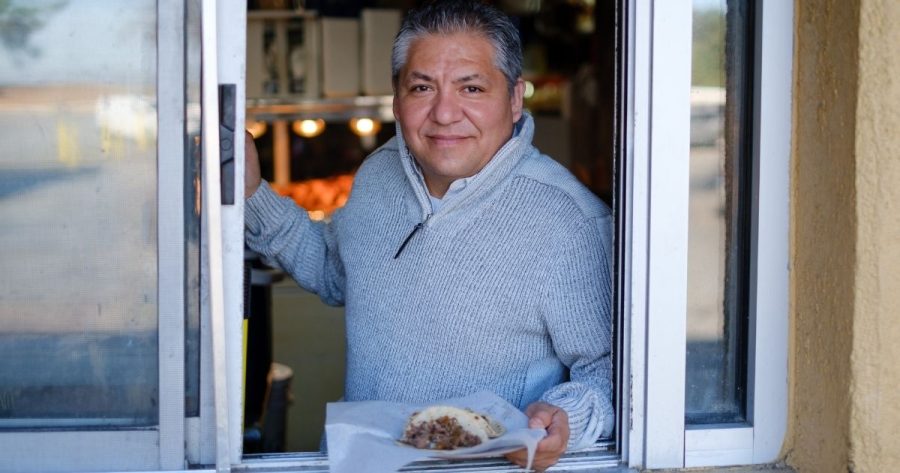
“For a small business entrepreneur, they’re not savvy in digital and media. Some of them have email addresses from Yahoo that they barely ever check,” says Pabian. “That engagement with their customers was really through the experience that they created through their hole-in the-wall, or their authentic little bistro. When you strip that away, it’s all about marketing and communi cation. So, how do you wrap your arms around that while still trying to juggle keeping your lights on?”
Curveballs of Life on Buford Highway
Thip Athakhanh, owner of Snackboxe Bistro, a Laotian restaurant located a mile and a half from the Buford Highway farmers market, has been adapting to the curveballs thrown by the pandemic since it hit.
Snackboxe opened in 2018 as the first “100-percent, fully unapologetically Lao’’ restaurant in Atlanta, according to Athakhanh, and in just a few short years, it has made a big impact on the food scene. Encouraged by the restaurant’s success, Athakhanh decided to open a stall in a food hall in Southeast Atlanta in February 2020. But the pandemic quickly changed her trajectory. She’s since closed the food stall (“it was a huge financial strain. We had to close up and stop the bleeding there”), reworked the main restaurant to accommodate takeout orders and added takeout-friendly menu items, opened a new location in Duluth with a 1,500-square-foot patio, and is starting a take-home dinner service called Amkha Omakase.
Athakhanh is, in a phrase, in constant motion.
Being resourceful in the face of uncertainty is in her DNA. Her parents left Laos and lived in a refugee camp in Thailand before moving to Louisiana in 1983 when she was two years old. Her family stayed in the South, working in factories in New Orleans and later Alabama, before moving to Georgia.
“We didn’t have the luxury of going out to get fast food—that was expensive for us. What we did was grow our own food. Whatever land we had in the house we rented, we’d just throw something in the back, like vegetables and herbs. Lao food relies heavily on herbs and vegetables,” she says.
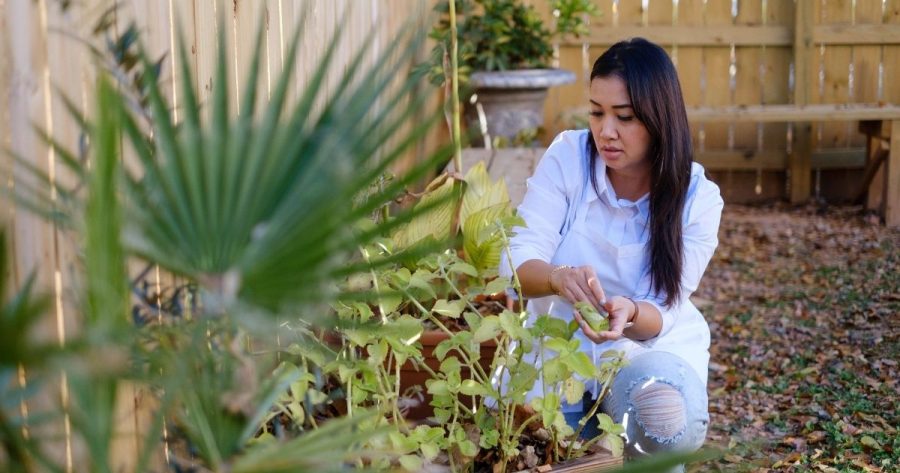
Athakhanh was eleven when her mom left the family, so she took over feeding her father and three younger siblings. “He would work a lot and travel. So, when he would come home, he couldn’t eat American food. He had to have sticky rice and a simple soup. So there I was, eleven years old, making sticky rice for him.”
Snackboxe’s menu includes the classic recipes Athakhanh grew up cooking, like laap. “It’s a minced meat salad tossed with a lot of herbs, rice powder, chili flakes, and lime juice, eaten with sticky rice.” But she’s also constantly adapting the food and experiments with new flavors to keep customers interested. One of her most popular appetizers is a fried squid on a stick, a recipe she created for a night market event.
Reminder of Home
The back wall of her restaurant is covered by a photograph of a market in Luang Prabang, the former capital of Laos. It was during a trip there with her husband in 2016, walking through the market, when she realized she wanted to bring Lao food to Atlanta. She hadn’t lived there since she was 2, but that trip made her feel like she was home. She decided then and there that she would bring that taste of home back to Atlanta.
“Our culture and language might be different, but at the end of the day, we’re all the same. We just miss home,” Athakhanh says. That’s just what has kept Pabian so invested in her work to preserve and celebrate everything that makes Buford Highway what it is today. The cultural center that her father started in the Chinatown Mall is still there.
When she visits these days, she doesn’t recognize as many people as she once did. But still, she feels a familiar zing. “The one thing that I love about Buford Highway, is you feel alive. Even to this day, when I go to Chinatown, I always have a little spring in my step” she says.
If the uncertainty of the pandemic has taught us anything it’s to pay attention to the things that anchor us, that remind us where we’re from. For me, for Pabian, and for countless others, it might be the memory of a strip mall, a bowl of pho, or a bite of roti canai. On Buford Highway, whether you live or work there, or you’re just passing through, there’s a good chance you will find something that reminds you of home.
share
trending content
-
Outdoor Adventure and Historic Charm Awaits in St. Martin Parish
by TLP's Partners -
6 Things to Do Beyond Golf in Pinehurst
by TLP's Partners -
Charlottesville, Virginia Named Wine Region of the Year
-
A New Home for Lazy Betty
by Lia Picard -
Will Travel for Southern Food
by TLP Editors
More From On the Road
-
6 Things to Do Beyond Golf in Pinehurst
-
The Bluegrass Spirit | Listen
-
Slugburger Trail with a Side of Nostalgia
-
Experience All That is New in Pinehurst, North Carolina
-
Flavor Towns On Mississippi’s Gulf Coast | Listen
